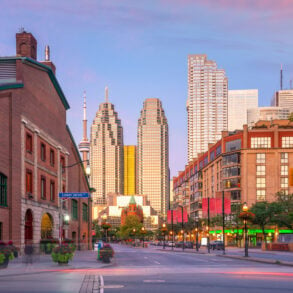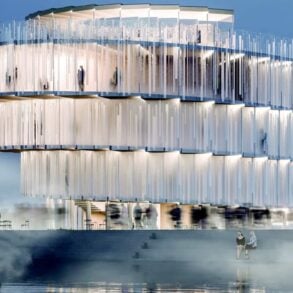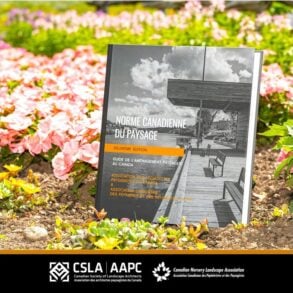
‘Instilling hope and optimism is vital to young architects’
It’s really hard to put your finger on why there is so much negativity around the RIBA. It’s not incompetence and it’s certainly not indifference. I have come to the conclusion that it’s an unintentional but endemic arrogance. There’s a feeling that this is a ‘national treasure’, but like the NHS or Post Office, you are a national treasure until you’re not. My aim to address this would be to change the culture to create a safe space for debate and a greater exchange of ideas – an authentic, respectful and collaborative culture.
What do you think the RIBA is good at – and what not so good at? How would you play up the former and address the latter?
The RIBA does such a lot well, but no one seems to appreciate it. Certainly, the issues I have unearthed in my campaign about awards, membership and governance are met with opaque responses. It would appear there is more than one royal institution with the motto ‘never complain, never explain’.
Since I decided to stand a few weeks ago, my inbox has been full of concerns and complaints. Often, the complaints are unjust and a result of poor communications – architects are busy and much of the good work of the RIBA is largely unappreciated. Nevertheless, simple things could make a difference.
‘Much of the good work of the RIBA is largely unappreciated’
Having an efficient helpline would be hugely beneficial. Unless I am mistaken, there is only one phone number for RIBA members. In my manifesto I also advocate that the RIBA should be the go-to organisation for architectural competitions to ensure they are well run and limit the amount of work.
How can the RIBA become relevant in education again?
The reforms instigated by the Hackitt Report give greater powers to the ARB, not the RIBA. Yet around the world, it is the RIBA’s influence and experience in education that is sought. I believe greater commitment to lifelong learning will enable greater social mobility and improve diversity, opening new career paths and, in a very practical way, supporting members at different stages in their lives. Selling learning modules online, and opening up membership of an international RIBA, would allow architects from Shanghai to Seattle to benefit from a competitive advantage in their own markets.
It will be a long road to the regulation of function but I believe we should start. The public would be best served by regulating who can make planning and building regulations applications for projects above a certain size. I wrote the dissertation for my MSc in project management on ‘why the architect is best placed to act as project manager’ and I still believe it – with the caveat that it must be in conjunction with proper training. The RIBA should help, advise and encourage architects to profit from their skills and subsidise them to acquire new ones, whether in project management, BREEAM assessment or property development.
‘It’s a long road to the regulation of function, but we should start’
We must overhaul one-size-fits-all CPD. We need to let architects develop their own career paths and widen learning options. We have some of the world’s best and most respected educational establishments and I’ve discussed with online providers how to ensure learning modules are robust, educational, relevant but also reasonably entertaining. Part 3 could follow the same process and allow examinations and retakes at a time and place of the student’s choosing. I think this would reduce stress levels enormously.
How can the RIBA reconnect with the regions? And will closing the RIBA’s London HQ for refurbishment be an opportunity for this?
The RIBA should be the first port of call in addressing local challenges, harnessing architectural expertise to address relevant issues such as flooding, decarbonisation, infrastructure, conservation, design and planning decisions.
I recently bought a disused derelict church in my home town in Derbyshire and converted it to a community arts centre. I have had 90 architecture students from Nottingham Trent University doing a project looking at turning Ilkeston into a creative hub. So I know the energy there is in the regions and the RIBA needs to support it. There is too much control centrally so I propose retaining more money locally from members’ subscriptions to allow them greater autonomy.
‘I propose retaining more money locally from members’ subscriptions’
There is also enormous enthusiasm in the overseas chapters for the RIBA. I recently visited the Gulf Chapter and was impressed with the level of activity. I am familiar with the US, Hong Kong and Chinese chapters and the huge efforts to establish and maintain the profile of the RIBA in these regions. The RIBA needs to work with other well-established bodies, such as the Commonwealth Association of Architects to tackle global issues. And the institute needs to support this with financial help.
We could also make more of our International Awards if they were judged and promoted regionally. We could establish regional hubs in libraries, working with other civic institutes to showcase our combined expertise holistically.
66 Portland Place is a fantastic building, but conservative estimates for the work to improve its energy efficiency and accessibility are around £50 million. The renovation is a considerable investment, but with the long lease, it makes sense financially – but only if we make the building work for us for outreach and influence. We must put those changes in place first before embarking on this massive investment.
‘Transparency around the plans for the headquarters so far has been pretty derisory’
I would only embark on this agenda with the full support of the board, council and executive. One of the reasons the RIBA has been unable to make real change in the past is due to tension, not collaboration, between these bodies. My whole professional life has been based on teamwork and I will draw on the ideas, hopes and aspirations of all RIBA members to bring about change. So far as I am aware, the consultation and transparency around the plans for the headquarters so far has been pretty derisory – mostly just a LinkedIn poll and a few boards on the first floor.
How will you champion architects to the next government? Where has the RIBA failed in the past on lobbying?
The RIBA is home not only to some of the world’s best designers but also experts in housing, social care, health, education, transport, infrastructure, heritage, sustainability and so many other subjects. And they are passionate about their areas of expertise – yet the RIBA isn’t involving them enough.
We make a grand occasion of installing honorary fellows but then don’t involve them either. But they are keen to be involved! We need to be much more strategic about collaboration. I would pair our architectural experts with the relevant minister and use our pool of talent. Create good relationships with all decision-makers at all levels: regionally, nationally, internationally.
How can the RIBA help practices to be more profitable and help raise salaries and conditions for architects?
From my initial research, pay and influence are most architects’ biggest concerns. I don’t think we will change this overnight but my plans, if implemented, will ratchet up fees and therefore pay by convincing politicians, decision-makers, clients and industry of the true worth of our work.
‘The RIBA has to make a stand – it has to stand for something’
I can see no reason why minimum salaries should not be a prerequisite of RIBA membership. The same goes for outlawing unpaid overtime. Good practice is one more brick in building a respected, trusted global community. Still, I would not want to dictate to anyone how to run their business.
There are many successful business models and everyone chooses their own way. But the RIBA has to make a stand – it has to stand for something, and I believe that should include fairness and trust.
How would you approach the UK-Saudi relationship as president? And would you continue to back Great Futures if the next government continues with the programme?
I have been a big supporter of the ‘Great’ campaign both at home and abroad for many years. I have represented the RIBA and the profession on various trade visits. I was very proud when Weston Williamson was awarded the Queen’s Award for Export in 2019 – acknowledgment of the work we have done around the world, exporting the skills we have honed at home to other countries. We learn a lot from working abroad and it is great experience for all of our colleagues to work on the best city, shaping projects globally.
‘We’ve a rigorous process regarding ethics and inclusion’
Whenever we work abroad, we have a rigorous process regarding ethics and inclusion. We assess the politics, the regime, the client and the project.
We speak to other architects with experience in that country and seek the advice of the Foreign Office and the RIBA. We often work as subcontractors to large engineering firms, which have their own assessments for projects often dictated by shareholders. Our parent company Egis also has a rigorous system and has declined to work on some projects in the region because of a variety of concerns.
Any of our colleagues who are uncomfortable on any project or any regime has the right not to work on those jobs. There are many nuanced arguments and we democratically approach them all.
One consideration should be the direction of travel of each country. Are things improving? 1960s Britain was not particularly liberal and other countries are catching up. We are well aware that we have made mistakes in the past. Indeed, there are political decisions at home I still feel uncomfortable with. I think the RIBA should continually review relationships in many countries but I see no reason currently not to back Great Futures.
How do you currently view the state of the profession? And what drives you?
My passion, energy and enthusiasm for architecture has never waned. I remember running towards the Centre Pompidou when it came into view because I was so excited to see it for the first time. A few weeks ago, I got the same feeling travelling around in a minibus for four days with four other judges visiting 16 exceptional projects, chairing the RIBA regional awards. Ours is a wonderful profession but I sense from many of my colleagues that this is despite, rather than because of, the RIBA.
I’ve been honoured and humbled by the level of support I have received from all parts of the profession. I now have to work to translate that into votes.
Whatever happens in this election, I can die happy having been immortalised in a cartoon by Hellman in the Architects’ Journal – although I’m disappointed he didn’t choose to parody my public transport work, but rather my interest in business.
The aim for the RIBA must be a peaceful, fair, inclusive, happy and healthy environment with equal opportunities for all. Democracy is a wonderful thing and it works best with well-informed and engaged voters.
This Q&A was originally published on 12 June 2024
This post was originally published on this site be sure to check out more of their content.







